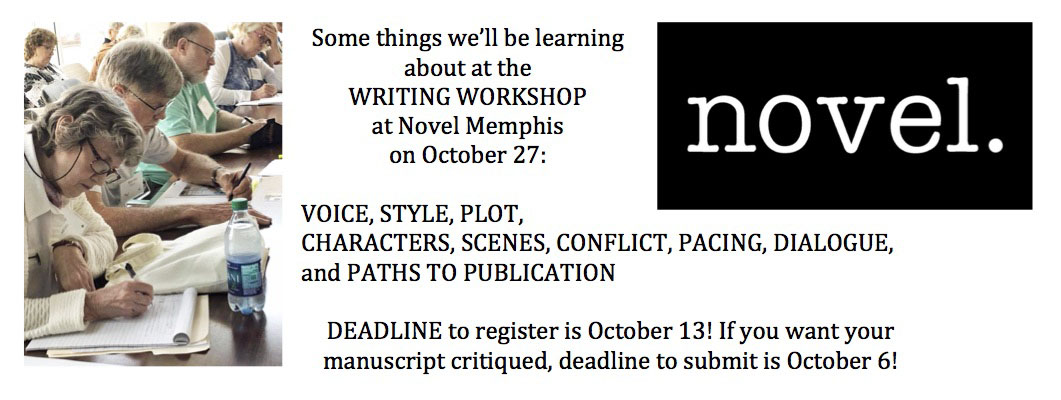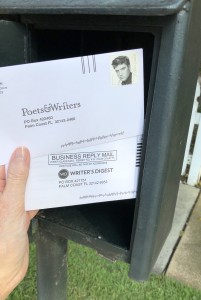
On October 27 I’m leading a one-day writing workshop at Novel bookstore in Memphis. So far fifteen people have registered, and I’ve begun critiquing the manuscripts that have been turned in. Before I began leading conferences and workshops, I participated in about ten workshops over a decade, as well as being part of two writing groups that use the “workshop” model. I’ve come to really appreciate how much the process can help us become better writers. We can learn from reading and critiquing other people’s works as much as having our own work discussed. So far the writing samples that have been submitted include adult fiction, YA (Young Adult) fiction, memoir, and essays. Before diving into the critique process, I decided to create some guidelines, which I will share with the workshop participants. I have gleaned these from past experience at workshops, and also from other writers and online sources. I hope you will find them helpful as you look at your own work or participate in writers groups or workshops. Here they are:
Things to look for in reading/critiquing manuscripts:
Effectiveness of story/plot. Can you summarize the plot in one to two sentences? What is the central idea?
Prose style and voice. Does the author have a distinct style and/or a voice that the reader can embrace? What’s the difference between style and voice?
*Voice is your own. It’s a developed way of writing that sets you apart from other writers (hopefully). It’s your personality coming through on the page, by your language use and word choice. When you read a Dave Barry column, you know it’s his. Why? He’s developed a distinct writing voice.
*Style is much broader than voice. Some writers have a writing style that’s very ornate—long, complex and beautiful sentences, packed with metaphors and imagery (think Frank McCourt and John Irving). Others have a more straightforward style—sparse prose, simple sentences, etc.
Characters—can you clearly identify the protagonist and antagonist? (Keeping in mind the antagonist doesn’t have to be a character, but can even be fate, the environment, etc.) Do we CARE about them? (Whether we like/love or dislike/hate them.) Are they believable? Are they interesting? (watch our for stereotypes and clichés) What does your character WANT?
Balance of scenes (including dialogue)—i.e. SHOWING—with narrative—i.e. TELLING.
Is there conflict? (Keep it mind it might not be resolved in an excerpt from a book, but it should be resolved in a complete manuscript like a short story or an essay.)
Pacing—too slow or too fast? How to change it?
Dialogue—is it realistic? If dialect is used, is it done well/sparingly or overdone and possibly even offensive?
 *I borrowed these definitions of voice and style from “The Difference Between Voice and Style in Writing” by Brian A. Klems. This was a Writer’s Digest article. I highly recommend that anyone serious about writing subscribe to two magazines: Poets & Writers and Writers Digest.
*I borrowed these definitions of voice and style from “The Difference Between Voice and Style in Writing” by Brian A. Klems. This was a Writer’s Digest article. I highly recommend that anyone serious about writing subscribe to two magazines: Poets & Writers and Writers Digest.
When contributing during the oral critique session:
Don’t comment about spelling and grammar errors. This is not the time for line editing.
Be positive and encouraging, but not dishonest and gushy.
Don’t give your opinions on the subject matter or the writer’s opinions. This is not a time to discuss/debate issues of politics, religion, race, gender, etc., but to help each other become better WRITERS, no matter the subject or genre.
In addition to leading three hours of manuscript critique sessions during the workshop, I will also be giving two talks:
“Writing Scenes to Move the Narrative Forward” (This will include hands-on participation by students and a short writing exercise.)
“How I Got 4 Book Deals in One Year Without an Agent” (This will be a talk about all things publishing: querying presses, working with editors, etc.)
The workshop is from 9-5 on Saturday, October 27, and includes coffee/pastries, lunch together at Libro (the wonderful cafe inside the bookstore), and happy hour from 4-5 p.m. (Lunch isn’t included in the $75 registration fee.)
The deadline to register for the workshop is October 13, but if you want to submit a manuscript to be critiqued, the deadline to send in your writing sample is October 6 – this Saturday. (Not everyone who is coming to the workshop is submitting a manuscript.) You can REGISTER FOR THE WORKSHOP HERE.